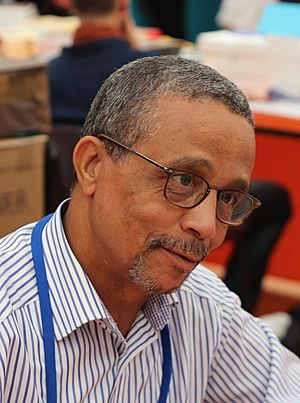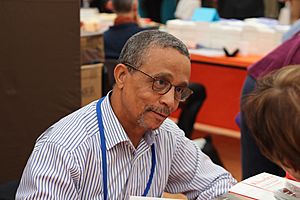Yasmina Khadra facts for kids
Quick facts for kids
Yasmina Khadra
|
|
|---|---|

Khadra in 2014
|
|
| Native name |
Mohammed Moulessehoul
|
| Born | 10 January 1955 Kénadsa, Béchar Province, Algeria |
| Pen name | Yasmina Khadra |
| Occupation | Novelist |
| Language | French |
| Notable works |
|
| Notable awards | |
| Signature | |
 |
|
Mohammed Moulessehoul (born January 10, 1955) is a famous Algerian author. He is much better known by his pen name, Yasmina Khadra. He lives in France and writes his books in French.
Yasmina Khadra is one of the most well-known Algerian novelists in the world. He has written nearly 40 novels. His books have been published in more than 50 countries. Khadra often writes about conflicts in Algeria and other Arab countries. He explores how people are affected by political issues and how some are drawn to extreme ideas. He also writes about the differences between Eastern and Western cultures. In his books about the Algerian war, he showed how both the government and extremist groups played a part in the country's troubles.
Contents
About Yasmina Khadra
His Early Life and First Stories
Mohammed Moulessehoul was born in 1955 in a place called Kénadsa, in the Algerian Sahara desert. His mother was a great storyteller from a nomadic tribe. His father was a nurse who joined the Algerian National Liberation army. This army fought for Algeria's independence from France.
When Mohammed was nine, his parents sent him and his two younger brothers to a special cadet school. This school was for children of the revolution. Khadra later wrote in his autobiography, The Writer, that this is where he found his love for writing. It gave him a private space that he missed in the busy dorms. He first wanted to be a poet writing in Arabic. But then he met a French professor who inspired him.
At 18, while still at military school, he finished his first collection of short stories. These stories were published eleven years later in 1984 under the title Houria.
His Military Career and First Novels
When he was 23, Khadra finished his training at the Cherchell Military Academy. He then joined the armed forces as a second lieutenant. Between 1984 and 1989, he published three collections of short stories and three novels using his real name.
In the early 1990s, he was a commander in the special forces. He was stationed near the Algerian-Moroccan border and in Oran Province. During this time, the military was fighting against extremist groups. He faced many dangerous situations, including ambushes.
To avoid a rule that made soldiers get their writings approved by a military board, Khadra started using different pen names. One of these was 'Commissaire Llob'. This name was also used for the main character in a series of detective novels. Inspector Llob was an honest police detective who tried to expose problems in Algerian society. These problems included corruption and favoritism. Because of this, he often found himself caught between extremist groups and powerful leaders.
After his first two books, Khadra could only get his work published outside Algeria. To get around the censorship, his wife signed his publishing contracts. Later, to honor her, he chose her first two names as his pen name: Yasmina Khadra. This means "green jasmine blossom."
In 1997, Khadra published the detective novel Morituri. This book helped him become known around the world. It was even made into a film in 2004. Morituri, along with Double Blank (1998) and Autumn of the Phantoms (1998), form a trilogy. This series shows the Algerian Civil War and its causes in a very real and interesting way. He wrote these novels for European readers, focusing on the reasons behind extremism. He described daily life in Algeria, including violence, corruption, and the lack of opportunities for many people. These novels helped make detective stories popular in Algerian literature. In the last book of the series, Inspector Llob is found to be the author behind the Yasmina Khadra pen name. He is then removed from his job and dies.
Khadra himself was able to avoid a similar fate. In 2000, he left the army to focus on writing. He moved with his family to France, going through Mexico first.
Life in France and Many Novels
Khadra settled in a town called Aix-en-Provence in France. In 2001, he published his autobiography, The Writer. In this book, he shared his experiences as both a soldier and a writer. He received an award from the French Academy for it. That same year, he revealed his true identity. He decided to keep his pen name, Yasmina Khadra, to show respect for his wife. She had helped them start a new life in France by working with publishers. At first, people were surprised to learn that Yasmina Khadra was a man.
The woman who had written several well-received novels in French and who had as a result been clasped to the Gallic literary bosom as a writer who would, finally, give an insight into what Arab women were really thinking, turned out to be a man called Mohammed Moulessehoul. And not just a man, but an Algerian army officer with three decades of military experience behind him. And not just an army officer, but one who had led a struggle against armed Islamist radicals and who, as a result, faced opprobrium in the French media for being tainted with the blood of civilians killed in brutal oppression by the north African state.
One French critic later said, "A he or a she? It doesn't matter. What matters is that Yasmina Khadra is today one of Algeria's most important writers." Even though Khadra lives in France, he tries to help people understand different viewpoints.
After his Algerian trilogy, he published The Swallows of Kabul in 2002. This book takes place in Afghanistan in 1998. It shows life under the Taliban and the challenges faced by Afghan women. In an interview, Khadra explained that he wanted to offer a Muslim perspective on Afghanistan and religious extremism. He felt that Western views often only scratched the surface of the problem. He believed his novel could help readers understand the deeper causes of fanaticism, which he sees as a threat to everyone.
A reviewer from Newsweek magazine called The Swallows of Kabul a "masterpiece of misery." They said few writers have shown so powerfully what it feels like to live in a society where extreme beliefs control everything. The book was nominated for a major literary award in 2006. It was also made into an animated film in 2019.
In 2004, Khadra published Dead Man's Share. In this crime novel, his character Inspector Llob becomes a pawn in the hands of powerful people in Algeria after it gained independence.
The Attack (2005) explores the conflict between Israelis and Palestinians. It follows an Arab Israeli couple living in Tel Aviv. The main character is a successful doctor whose life changes completely when his wife becomes involved in an extreme act. The novel won several literary prizes in 2006. It was the first time an Algerian author won the Prix des libraires, an award chosen by thousands of bookstores. The Attack was also nominated for the IMPAC award in 2008. A film based on the novel, also called The Attack, was released in 2012 and received good reviews. In The Sirens of Baghdad (2006), Khadra writes about the Iraq War.
What the Day Owes the Night (2008) is a long story set in Algeria between 1930 and 1962. It tells a brave story about the mix of French and Algerian cultures. One review described it as a rich tale of family, love, and war. It shows what colonized Algeria was like from the inside. A film adaptation of this novel was released in 2012.
In 2011, Khadra received the Henri Gal Grand Prize for Literature from the French Academy. This was a great honor.
His novel Cousin K (2003) was described as a "giant of a literary work" by the New York Journal of Books. In Khalil (2018), Khadra writes from the perspective of a character involved in a major event in Paris in November 2015. This novel was one of the best-selling books in France in 2018.
Yasmina Khadra's novels have been translated into 48 languages. They have been published in 56 countries. Besides being made into films, his books have also been adapted for theater and comics.
From 2007 to 2014, he was the director of the Algerian Cultural Center in Paris. He was asked to take this job by the President of Algeria, Abdelaziz Bouteflika. However, Khadra was removed from this position after he called the President's fourth term "absurdity."
Presidential Campaign
On November 2, 2013, Khadra announced that he wanted to run for president of Algeria. However, he was not able to get enough signatures to qualify. He needed 90,000 signatures but only collected 43,000.
Film Adaptations of His Books
Many of Yasmina Khadra's books have been made into movies:
- 2007: Morituri, directed by Okacha Touita
- 2007: Dhokha, directed by Pooja Bhatt
- 2012: What the Day Owes the Night, directed by Alexandre Arcady
- 2012: The Attack, directed by Ziad Doueiri
- 2019: The Swallows of Kabul, directed by Zabou Breitman
Awards and Honors
Yasmina Khadra has received many awards for his writing:
- 2001: 'Médaille de vermeil' from the French Academy for The Writer
- 2005: "Best Book of 2005" by the San Francisco Chronicle and The Christian Science Monitor
- 2006: Prix des libraires for The Attack
- 2006: Prix Tropiques for The Attack
- 2011: Henri Gal Literature Grand Prize from the French Academy
- 2018: Grand Prix of Literary Associations (Belles-Lettres category) for Khalil
- 2025: Pepe Carvalho Awards
- 2025: Casa Mediterráneo Awards
See also
 In Spanish: Yasmina Khadra para niños
In Spanish: Yasmina Khadra para niños
- Algerian literature
- List of Algerian writers
- African literature
- List of African writers by country
 | James Van Der Zee |
 | Alma Thomas |
 | Ellis Wilson |
 | Margaret Taylor-Burroughs |


